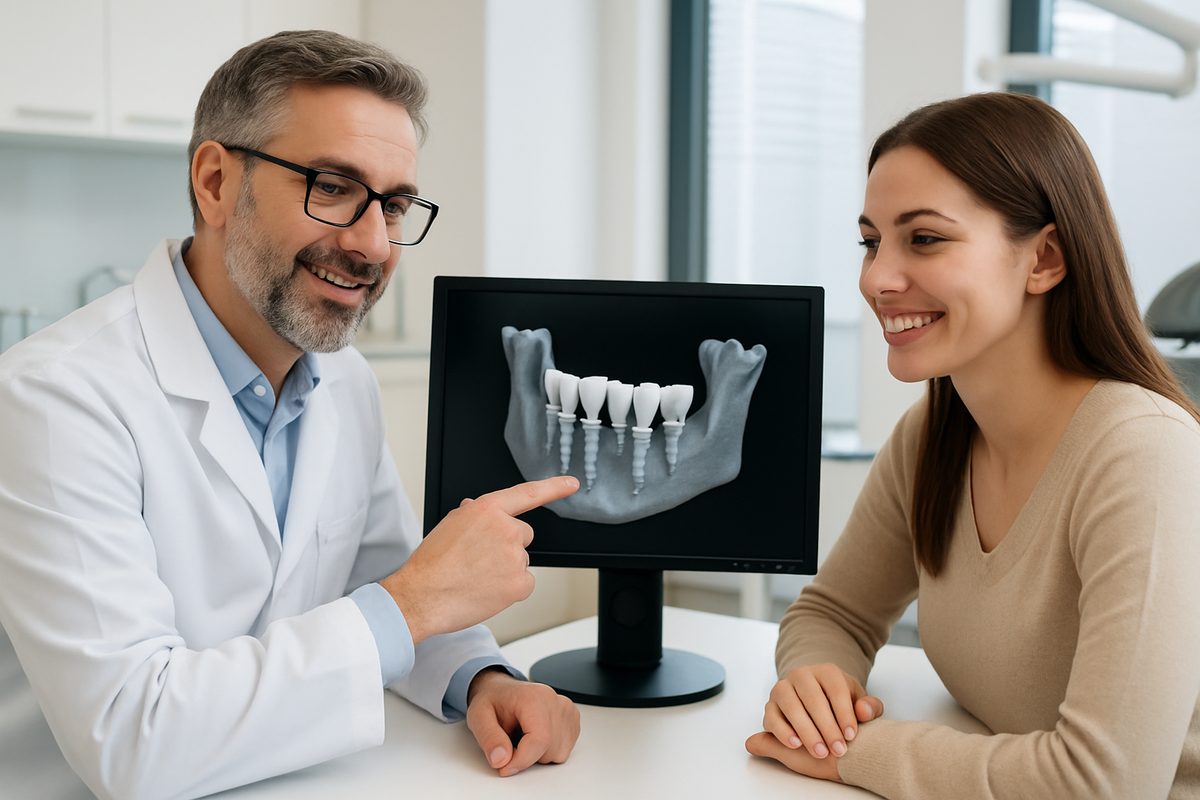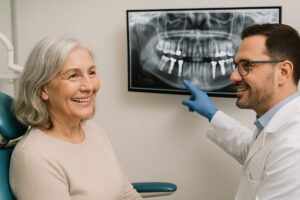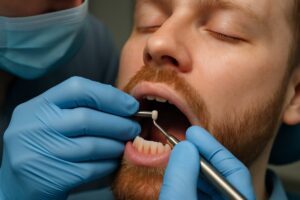Considering an implant doctor? An implant doctor is a specialist who places and restores dental implants to replace missing teeth. Many people ask “Is it time?” when they struggle with loose dentures, missing teeth, trouble chewing, shifting teeth, or recurring gum infections.
This guide will help you decide when to see an implant doctor, explain common treatments, outline the typical process, and offer practical next steps for booking a consultation with an implant doctor in Lilburn, GA.
When to See an Implant Doctor
See an implant doctor when oral problems start affecting your daily life or oral health. Common warning signs include:
- One or more persistent missing teeth
- Shifting or drifting teeth after tooth loss
- Loose or uncomfortable dentures
- Difficulty chewing or speaking
- Chronic gum infection or pain near a tooth
- Notable jawbone loss on X-rays or a sunken facial appearance
Quick checklist: if you have any two of the signs above, or if dentures no longer fit, it’s a good idea to consult an implant doctor.
What an Implant Doctor Does
An implant doctor provides surgical and restorative care for replacing missing teeth. Typical services include:
- Single-tooth implants to replace one missing tooth
- Implant-supported bridges for several missing teeth
- All-on-X or full-arch solutions for a fixed set of teeth
- Bone grafting and sinus lifts to rebuild support when bone is low
- Periodontal care to treat gum disease before or after implants
An implant doctor handles surgical implant placement and works with a restorative dentist or lab to deliver the final crowns, bridges, or full-arch prosthetics.
How Implant Treatment Typically Works
Initial exam and 3D imaging
The first step is a clinical exam and CBCT 3D imaging. These scans show bone volume, nerve and sinus locations, and help the implant doctor plan safe placement. Good imaging reduces surprises and improves outcomes.
Treatment planning and timing
After imaging, your implant doctor will create a treatment plan. This may include guided implant placement using surgical guides or robotic guidance, any needed bone grafts, and a timeline for healing. Typical phases:
- Consultation and imaging
- Surgical placement of implants (sometimes with immediate temporary teeth)
- Healing and osseointegration (weeks to months)
- Final restoration—crowns, bridges, or full-arch prosthetics
Choosing the Right Implant Doctor
Look for experience and proven results. Important credentials and traits:
- Board-certified periodontist or oral surgeon or experienced implant dentist
- Documented implant experience and case photos
- Clear communication about risks, timelines, and costs
- Good patient reviews and transparent complication rates
Questions to ask
- How many implants have you placed?
- What are your complication and success rates?
- Who will do the restorative crowns or prosthetics?
- Is there a warranty or follow-up plan?
Technology and team approach
Technology matters. Ask if the practice uses CBCT imaging, guided or robotic-assisted placement, and an on-site lab. A coordinated team—surgeon, restorative dentist, and lab—improves accuracy and esthetics.
Costs, Recovery, and Outcomes
Costs vary based on how many implants you need, whether bone grafting is required, and the type of final restoration. Recovery is usually a few days of soreness, with most people back to normal activities in a week. Full healing takes several months.
Implant success rates are high—often above 95% with proper planning and care. Long-term benefits include better chewing, improved speech, bone preservation, and restored confidence.
Why an Integrated Center Can Help
Centers that combine surgical implant care, advanced tech, and an on-site lab can shorten timelines and improve predictability. For example, an integrated center with Yomi robotic-guided surgery, CBCT imaging, and an in-house master lab helps the implant doctor in Lilburn, GA deliver precise placement and natural-looking restorations faster.
An integrated team can manage complex cases under one roof, reducing the need for multiple referrals and giving patients clearer timelines and costs.
Meet the Doctors
Gwinnett Dental Implant Center is led by board-certified periodontists who focus on implant and periodontal care. Dr. Melody Schiffer and Dr. Nisha Kancherla bring advanced training, board certification, and experience with complex implant cases. They emphasize evidence-based care, patient comfort, and clear communication.
Next Steps: How to Book a Consultation with an Implant Doctor
To prepare for your first visit with an implant doctor in Lilburn, GA, bring any recent dental X-rays, a list of medications, and notes on your symptoms. Prepare questions about experience, technology, expected timeline, and financing or insurance options.
If you suspect it’s time for an implant doctor, call to schedule an evaluation. A brief consultation and CBCT scan will give you a clear plan and next steps toward a stable, lasting smile.








